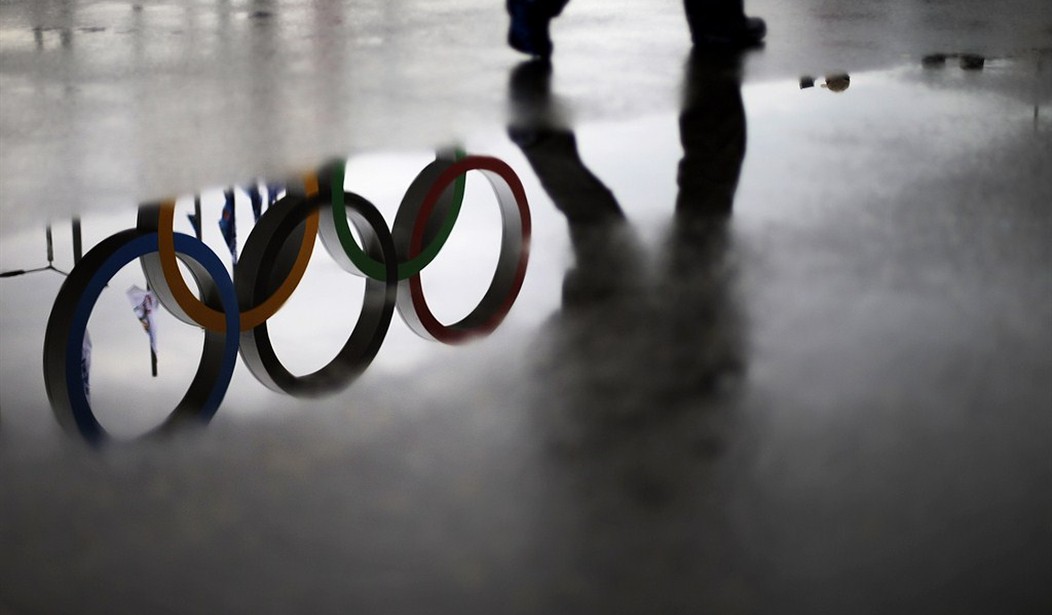SOCHI, Russia -- There are two things I probably forgot to mention about my time here at the Winter Olympics in Russia.
But now that I'm wrapping up, I'll tell you.
One is that there are palm trees everywhere, the fronds wafting in the warm breezes off the Black Sea.
Palm trees just say "Winter Olympics" in Russia, don't they?
And the other thing involves the crazy Russian band with the whirling women and whistling and stamping of feet outside my hotel window.
Each morning I'd be treated to their singing and dancing, the women whistling through their fingers in the style of shepherds and savage herdsmen of the Caucasus.
And then there would be more whistling and stomping and plenty of "Hai!" and "Hah!" and always with the "Lai-Lai-Lai-la-la-la-la-la!" over and over and over, never-ending, as if I were trapped in a demonic accordion operated by a leering madman.
But they stopped playing the other day. And they haven't returned. The bandstand is empty. And it made the little row of vendors' booths before it a bit more sad than usual.
Not all the shops closed. The two honey shops selling medicinal honey stayed open, as did the Siberian cedar flour shop, flour guaranteed to make you strong. But the vendor of hand-embroidered purses was gone. The mead vendor closed, too, but then reopened. She sold good warm mead for only 50 rubles a cup, and much mead did I drink.
"No business," said a beekeeper, who like the rest paid a fee to set up shop, hoping guests at the hotel would enjoy their wares. His hopes were ruined.
Before him were his various untouched tubs of honey from different mountain flowers. Before each tub was a hand-lettered exhortation in oddly translated English. For example:
Recommended
"Drone Blood! For chronic weariness, stress, thyroid diseases, male infertility, menopause, hormonal violations sphere!"
Hormonal violations sphere?
"No Englees," said the beekeeper with a sad shake of his head. "No business. No Englees."
Another honey vendor sold "Alpine Honey," with a card that read, "This time when gets old chestnut has bright bacterial properties!"
Unfortunately for the vendors, my hotel catered to journalists and Olympic technicians, and they weren't interested in Drone Blood.
But a strange thing happened the other day. A new shop opened, and it drew quite a crowd.
A whip shop.
Tatiana the whip merchant wore a gray fur hat. On the wall she pinned a blue T-shirt with a picture of a mountain lad and a horse, and she was ready for business. Reaching into her bag she heaped piles of leather-braided whips upon her shelf, some with handles carved as tiger heads.
Some were long whips for the driving of cattle and livestock from horseback, and some were short, possibly for dogs or perhaps for unwilling human backs.
A group of about 10 Cossacks came up and began to heft the whips, whistling and cracking, and laughing. They seemed like they could handle themselves in a scrap but were decent fellows, young and rowdy and lean.
"They are Cossacks," said a police officer.
How do you know?
"I am Cossack," he said. "They are Cossacks."
Watching them play with the whips, I thought of what their great-grandfathers did to the Jews during the pogroms, and what their great-great-great-grandfathers had done to the Circassians in the mountains just above us, whole populations driven from their homes with fire and sword.
The police officer politely refused a cigarette, and I asked him again: Are you certain these are Cossacks? Like the movie, "Taras Bulba"?
"Yes, Cossacks," he said, smiling. "'Taras Bulba' movie. Cossacks."
The young guys joked, cracking each other playfully, worrying the air with the whips, their wrists whirring, and I stood confounded.
How hospitable the people of Russia have been to me here, and yet, underneath, violence always seems to be waiting to break free in this nation of tribes.
I approached Tatiana, not to buy a whip but to ask her a question.
"No Englees," Tatiana said.
When I got to the office -- the Olympic media center -- I learned that Chicago native Shani Davis, the great American speedskater and prohibitive gold medal favorite in the men's 1,000 meters, had lost.
And the winner?
The Dutchman, Stefan Groothuis, whom I saw fall in the 500-meter sprint just a few days before. He tripped, slid in anguish for some 40 feet, got up and trudged the ice, head hanging in shame.
I had interviewed his parents. The mother concerned about her son's transition out of the sport, the father a former dairy farmer who said this would be his son's last Olympic Games.
Now, he goes out with the gold, defeating Davis, who was expected to become immortal in Sochi.
Each time I leave Chicago on a writing trip, I get to see amazing things: the Russian bath-mistress with the accent of Maria Ouspenskaya who refused to hit me with the birch branch, and those young cadets desperate to learn all about American girls.
And the beautiful, almost aristocratic young woman I saw praying at the Russian Orthodox Cathedral of St. Michael the Archangel, a girl who may become a matriarch someday and command her brood back into the ancient faith of her grandfathers.
And Josef Stalin's lonely dacha on the hills above us, a reminder of the murderer of millions whose memory is fading as Russia tells a new story about itself with these Games.
There's so much more to see and write, but it's time to go. So dasvidaniya, Sochi. Dasvidaniya, Russia. Goodbye and thank you. You've been wonderful.
But I have work to do back home.
























Join the conversation as a VIP Member